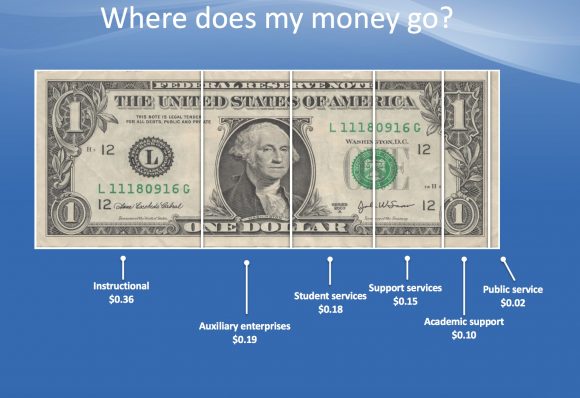Maddie Conley
Online Editor
Vice President of Finance and Planning, David Walker announced on February 19 that undergraduate tuition, fees, room and board will be increasing by 2.23 percent next school year.
“This is the lowest increase I’ve seen in my eight years here,” Walker said.
In previous years, Walker remembers tuition increases ranging from three to six percent. “We will never go back to anything above three percent. My goal is to keep coming down.”
The plan is to keep comprehensive fee increases under 2.25 percent per year. Walker desires to slow down the trajectory of us being on a course to get to $50 thousand per year. “I don’t want us to be there anytime soon,” Walker said.
Rising tuition impacts many students such as sophomore Rhianna Musser. “It is challenging to pay for Messiah at the tuition rate it is now, so it’ll be difficult to find that extra money.”
The total of $900 more tuition dollars per year is due to the college’s continuously rising cost structure. The maintenance of buildings and the salaries of faculty, staff and administrators are also factors.
“Sixty percent of our budget relates to people—its salaries and benefits,” Walker said. “We’ve modeled out very modest increases in compensations but one of the big cost we have is our benefits.”
Besides the cost of doing business, Messiah needs more money for financial aid packages since recruitment has become more difficult.
Walker said that in the mid-Atlantic region, the number of high school students continues to drop. “The recruiting pool has shrunk. There are not as many high school students in the mid-Atlantic region and that’s our bread and butter.”
Because there are fewer students to recruit and the same amount of higher education institutes out there, Messiah must increase its efforts in recruitment through scholarships and financial aid. “The consumer price index and other things we do, those costs will continue to rise. The only other way for us to pay for it is to increase our students, but that’s not happening.”
Walker believes this difficulty should be the college’s responsibility. “Our challenge is to do more with the resources we have and not do it on the backs of students,” Walker said. “That’s my job.”
Messiah’s recent upgrade to university status may help especially with the recruitment of international students, but possibly of undergrad as well.
Increased tuition will help with business and recruitment, however, Walker dispelled the often popular belief that students’ tuition goes toward new buildings on campus. “The new Welcome Center will be completely paid for by funds that we raise.”
Most large projects such as the Falcon Fitness Center, renovated Hitchcock Arena and finance lab in Frey Hall are funded with contributions from donors or borrowed money. “Those student enhancement type of projects we have found ways to fund that don’t rely upon tuition dollars,” Walker said. “Tuition dollars get pumped back into instruction, activities and residential life.”
Walker explained that 85 cents out of every dollar go back to student programming. “If you compare that to other institutions, I know they don’t pump that much back into your experience—curricular and co-curricular.”
Although much of students’ tuition goes back to their experience, Walker recognizes the impact an increase has on students and their families. “We recognize that any increase, even the lowest in my eight years here is still passing on more to students and parents,” Walker said. “I’m a fiduciary, but I’m also a parent. It’s a painful letter to write.”
But the reality is, for some, it may be an even harder letter to read. Sophomore Kevin Cook said, “Messiah’s tuition is pretty high as it is now, so an increase would make it difficult for my situation, as well as the financial situation for a lot of students here.”


